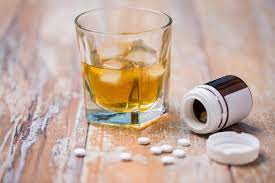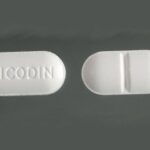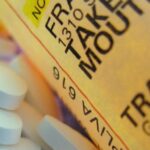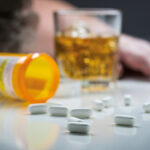What Happens When You Take Vicodin With Alcohol?

Vicodin is a brand name of a combination medication approved to treat moderate to moderately severe pain. This prescription drug is very effective at pain management and produces a euphoric high in large doses, making it “habit-forming” or potentially addictive.
Vicodin is an oral tablet that takes effect within an hour of taking it. When someone develops an addiction to the euphoric effects of this drug, they may crush their medication and snort it. They also may find ways to inject it, in which case it will take effect within minutes.
These tablets are a combination product containing two active ingredients: Acetaminophen and hydrocodone.
Acetaminophen is a mild pain reliever and fever reducer found in drugs like Tylenol and Panadol. It can cause liver damage and even be life-threatening in very high dosages. However, it is unlikely to be abused alone. Acetaminophen is purchasable over-the-counter and is not significantly addictive.
Hydrocodone is the heavy-hitter in Vicodin addiction. Hydrocodone is a potent opioid developed from the natural opiate codeine or thebaine. Like all opioids, this drug is a narcotic analgesic (painkilling) drug with highly addictive properties. It is similarly addictive to morphine.
What Happens When You Take Vicodin With Alcohol?
Combining Vicodin and alcohol is very dangerous. While acetaminophen presents serious dangers when combined with alcohol, the effects of hydrocodone often lead to polydrug use with alcohol. Alcohol can increase the dizzying effects of Norco, as well as increase the level of drowsiness that accompanies use.
Concurrent use can result in the following symptoms:
- Impaired judgement
- Impaired motor skills
- Confusion
- Respiratory problems
- Excessive sedation
- Coma
According to Medline Plus, consuming alcohol while taking any drug containing hydrocodone can result in life-threatening effects. Alcohol enhances and quickens the release of hydrocodone into the system, which can cause levels of the substance in the body to become dangerously high. It has been found that alcohol can increase the concentration of hydrocodone in the system more than twofold. It also increases the extent of absorption of the drug.
While people often intentionally abuse the combination of hydrocodone and alcohol, it can happen by accident. Those taking Vicodin should be vigilant in checking the alcohol content of anything they consume. For example, something as easily obtainable as over-the-counter cough syrup contains alcohol, and even a standard dosage can cause a very serious reaction when mixed with Vicodin.
Operating a motor vehicle or any kind of machinery can be dangerous after consuming either alcohol or Vicodin, but doing so after taking a combination of both substances can be especially hazardous. Mixing the two drugs can result in impaired judgement, which can lead to the decision to get behind the wheel. Furthermore, impairment of motor functions can make it extremely difficult for an individual to safely operate the vehicle once the person is on the road.
Vicodin Safety Information
Hydrocodone can slow or stop your breathing. Never use this medicine in larger amounts, or for longer than prescribed. Narcotic pain medicine may be habit-forming, even at regular doses. Never share Vicodin with another person, especially someone with a history of drug abuse or addiction. Keep the medication in a place where others cannot get to it.
MISUSE OF NARCOTIC MEDICINE CAN CAUSE ADDICTION, OVERDOSE, OR DEATH, especially in a child or other person using the medicine without a prescription.
Do not use Vicodin if you have used a MAO inhibitor in the past 14 days, such as isocarboxazid, linezolid, methylene blue injection, phenelzine, rasagiline, selegiline, or tranylcypromine.
Do not take more of Vicodin than is recommended. An overdose of acetaminophen can damage your liver or cause death. Call your doctor at once if you have nausea, pain in your upper stomach, itching, loss of appetite, dark urine, clay-colored stools, or jaundice (yellowing of your skin or eyes).
Stop taking Vicodin and call your doctor right away if you have skin redness or a rash that spreads and causes blistering and peeling.





